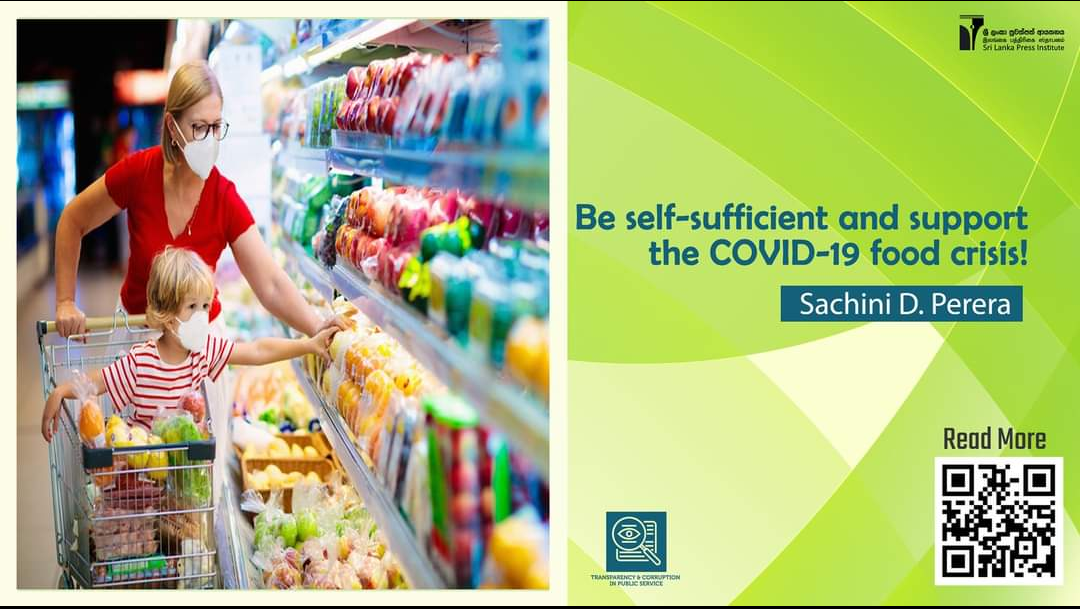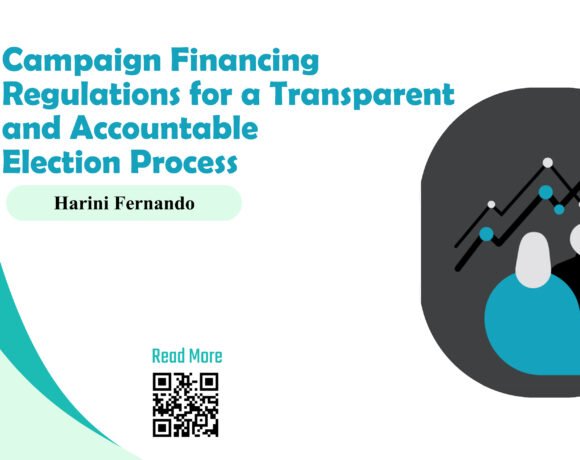
Be self-sufficient and support the COVID-19 food crisis!
Sachini D. Perera
Our country has been severely affected by the Covid-19 virus as we now face the second wave of the pandemic. The International Monetary Fund (IMF) stated that Sri Lanka is experiencing a continuous fall in the Gross Domestic Product (GDP) from 3.5% to 0.5%, after events such as the 2018 constitutional crisis, 2019 Easter Sunday attacks, and now from Covid’s first and second waves. At present, public expenses are only being made for top priorities such as medication, sanitation, food, and banking. Out of these top priorities, food consumption and nutrition are continuing its risk of multiplication due to the shortage and low purchasing rates of food. In addition, the increasing level of food redundancy and wastage has been identified and captured in media due to market closure, blockage of food transportation, logistics and especially the decline in consumer demand. The Sri Lankan people have been isolated from the outdoor environment and global support in nutrition as well. The food culture now has almost become totally inverted due to COVID-19.
Food safety issues were revealed after 49 traders tested positive during the second wave (in October) due to the rapid prevalence of the Covid-19 virus in the island’s main fish market. It was one of the clusters which hugely supported in spreading the virus to outer regions. The government imposed curfew in some parts of urban areas and specific areas outside Colombo. This incident captured public awareness on the safety of food amidst facing other Covid challenges.
The agricultural sector, comprising 30% of the total population, has been drastically affected by the Covid-19 outbreak as Sri Lanka is less integrated with the global food supply chain. The government even took timely measures to overcome the issue of food safety due to Covid by reducing large-scale food transportation, diminishing in-country food production, closing all shops that were not providing essential food services, price adjustments, temporary food import restrictions, etc. Agri farmers, livestock farmers and fishermen said they have lost more than they earn due to these sudden measures. In this sense too, the second wave seems more dangerous than the first. Therefore, with the rapid prevalence of the Covid-19 virus, the general public have hesitations about going out to buy vegetables, bakery items, meat and fish from places where people mostly loiter. People are now turning to crops in their home gardens instead of purchasing pre-cooked items due to the economic crisis and food safety issues that arose during this period.
The government still struggles to strengthen minimum capacity within the harvesting and manufacturing processes for essential commodities including vegetables and fruits to balance both farming communities and consumers. However, there were many complaints from farmers about the shortage of fertilizer and the quality of harvesting seeds available to continue harvesting following the health precautions. The other problem is that the public bears unnecessary fears of a future food shortage and therefore try to purchase more and more food items as soon as possible. This has also caused confusion about safeguarding manufacturing processes with minimum labour according to the health precautions given by medical experts. It is most important to maintain self-sufficient food consumption as it could fiercely affect low-income communities in the country. In addition, the government launched campaigns to motivate citizens to engage in home gardening by distributing free seeds. This was done to address concerns towards food security and qualitative nutritional practices during the pandemic. These actions could somewhat support the demand within local food chains.
With the situation being critical, it’s difficult to import foreign food products as it is impossible to filter the imported foods between ‘safe to eat/cook’ and ‘unsafe to eat/cook’. The latest Climate and Food Security Monitoring Bulletin of the World Food Programme (WFP) has paid attention to vulnerable areas of Sri Lanka and how agricultural conditions have been impacted due to the pandemic and climate, in order to assist in this food shortage. The report predicts that there would be malnutrition-amplified regions which will result from poor hygienic and sanitation practices due to Covid. As most of the population is rural and distant from overall awareness, those people might be affected by ill-immunization due to poor food safety practices which could lead to contracting viral infections. This is another considerable challenge we currently face along with the pandemic, as living without food is impossible.
Livestock has also encountered the same issues due to a lack of adequate animal feed, logistical constraints, essential veterinary medicines (imported), sudden labour shortage, food processing difficulties and limited capacities, closure of markets, reduced income to maintain the livestock in the country, etc. Nearly 5,000 broiler farms and 12,000 stocks of meat, chicken and eggs have expired due to the emergency situation. But cow and dairy milk farms were least affected as they got an opportunity to deliver fresh milk during the lockdown. This happened due to the sudden in-country restrictions imposed and adjusted with timely measures and decisions on purchasing and selling live animals, animal products and animal-by-products since March 2020 by the Department of Animal Production and Health. Although this decision was made as a precaution towards food safety during the pandemic, it impacted both the revenue and overall hunger of the public.
As the government allowed farmers and sellers to transport and deliver agri-foods and livestock in an occasional manner, the food redundancy and food wastage were beneficial when it came to troubleshooting on behalf of the food and economic issues of the public. Necessary cooking ingredients such as rice, grains, coconut and coconut powder, cooking oil, sugar and other spices were not at risk except turmeric powder which was disguised with unfair substitutes. With the rising commodity levy, the remaining imports had to be preserved due to the import restriction imposed since April 2020. As a result of this, PHIs had to work hard on investigating food frauds in shops and restaurants even at such an unsafe time.
Sri Lanka is still fighting the impact of Covid-19 to overcome the current food crisis. Close monitoring, continuing of agricultural activities under health precautions, machinery food processing implementations, secured food transportation and delivery service must be strategically handled to troubleshoot during such a moment of truth.








